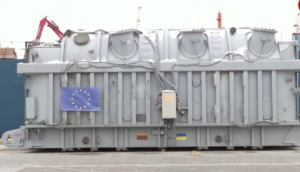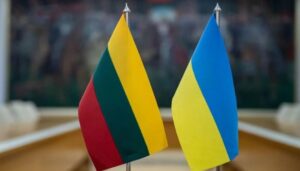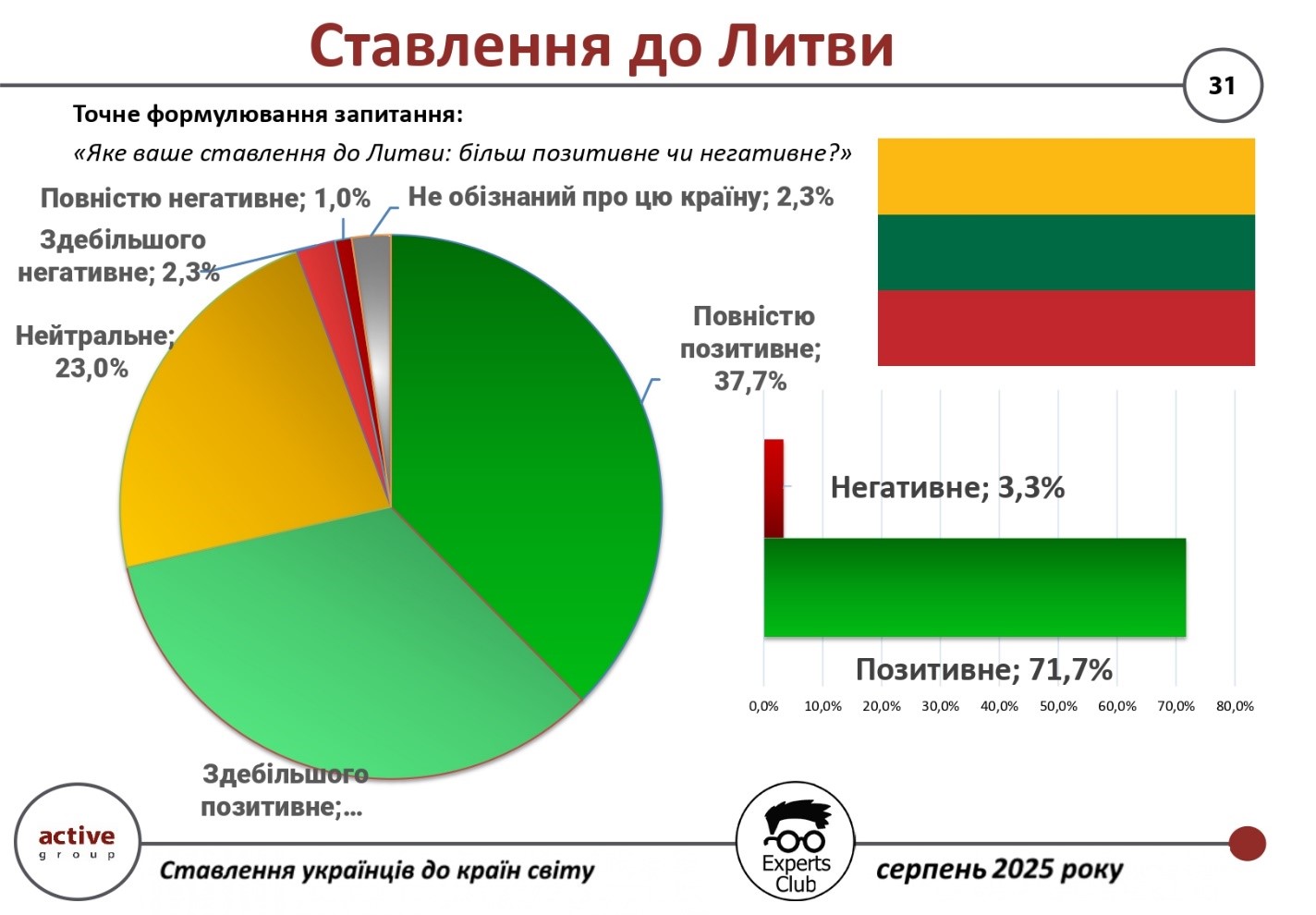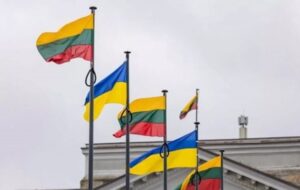
Lithuania wants Ukraine to become a member of the European Union by 2030 and will focus on this during its presidency of the EU Council in 2027, Lithuanian President Gitanas Nausėda said.
“Lithuania wants Ukraine to become a member of the European Union by 2030. This would be a decisive step towards ensuring long-term stability, security, and prosperity not only in this country but also for peace in the region. This is a strategic interest for Lithuania, which we want to continue to focus on during our presidency of the EU Council in 2027,” Nausėda said during a press conference in Vilnius with Polish President Karol Nawrocki and Ukrainian President Volodymyr Zelensky.
Nausėda said that Lithuania has already provided more than €1 billion in financial aid to Ukraine and called for long-term funding for the Ukrainian army. In addition, Lithuania has allocated more than €100 million for the reconstruction of Ukrainian schools.

Lithuania is sending Ukraine more than 90 generators to ensure the functioning of heating, electricity, and critical infrastructure, Lithuanian Prime Minister Inga Rūginienė said.
“Ukrainians are facing a serious shortage of electricity and heating due to Russia’s continuous shelling of energy infrastructure — a deliberate, brutal strategy that has been used every winter since the start of the war, this time with particular intensity and recklessness. Lithuania is sending more than 90 generators to ensure the functioning of heating, electricity, and critical infrastructure,” she wrote on social media.
The prime minister emphasized that Lithuania stands firmly on the side of Ukraine.
“On Ukraine’s Unity Day, we are sending warmth from Lithuania – power generators worth over €2 million. Lithuania supports Ukraine. Glory to Ukraine!” Lithuanian Foreign Minister Kęstutis Budrys wrote on social media.
Ukrainian Foreign Minister Andriy Sybiga also reported that he had spoken with his Lithuanian colleague and friend Kęstutis Budrys and thanked him for the announced assistance.
“I am sincerely grateful for the important news that Lithuania is providing Ukraine with much-needed additional energy assistance — a large number of generators to strengthen our resilience.
This is vital and timely assistance,” Sybiga wrote.
He informed his colleague about the situation on the battlefield and the latest developments in the peace talks.
The ministers agreed on further contacts at various levels and coordinated their positions ahead of international events to be held next week.
They paid particular attention to the next steps in promoting Ukraine’s integration into the EU.
“On this symbolic day — Ukrainian Unity Day — I expressed my gratitude to Kęstutis for his personal efforts in support of Ukraine and congratulated him on being awarded the Order of Merit by President Volodymyr Zelenskyy,” Sibiga said.

Lithuanian state-owned AB Energijos skirstymo operatorius, which operates the country’s distribution networks, will transfer another batch of equipment to Ukraine for the needs of the energy sector.
“Under the donation agreement, Ukraine will receive more than 200 power transformers of various capacities (…) The humanitarian aid is expected to arrive before the start of the heating season,” the Ukrainian Ministry of Energy said on Wednesday.
The equipment will be transported through the humanitarian aid and civil protection mechanism, which is funded and coordinated by the European Commission (ECHO).
“The transformers are critically needed for the rapid restoration of distribution networks damaged by Russian attacks, as well as to ensure a stable power supply to consumers in wartime,” said Energy Minister Svitlana Grinchuk, whose words are quoted in the statement.
The ministry explained that in order to respond quickly to enemy strikes and carry out operational repairs, it is necessary to have sufficient reserves of backup equipment. To this end, the Ministry of Energy has initiated the creation of a National Strategic Reserve of Power Transformers, which is being formed with the help of international partners, among others.
Since the start of the full-scale invasion by the Russian Federation, Ukraine has received 324 humanitarian shipments of energy equipment from Lithuania, with a total weight of 5,247 tons.


Lithuania remains one of the most positively perceived countries among Ukrainian citizens. This is evidenced by the results of an all-Ukrainian sociological survey conducted by Active Group in cooperation with the Experts Club information and analytical center in August 2025.
According to the survey, 71.7% of Ukrainian citizens have a positive attitude towards Lithuania (34.0% – mostly positive, 37.7% – completely positive). Only 3.3% of respondents expressed a negative attitude (2.3% – mostly negative, 1.0% – completely negative). At the same time, 23.0% of Ukrainians remain neutral, and 2.3% admitted that they do not have enough information about this country.
“For Ukrainians, Lithuania is a symbol of true friendship and unconditional support. The high level of positive assessments is the result of active political, military and humanitarian assistance from Vilnius during the war,” said Oleksandr Poznyi, co-founder of Active Group.
In turn, Maksym Urakin, founder of Experts Club, emphasized the economic component of relations between the two countries:
“In the first half of 2025, trade between Ukraine and Lithuania exceeded $988 million. At the same time, Ukrainian exports amounted to almost $348 million, while imports from Lithuania reached more than $640 million. The negative balance of about $293 million indicates Ukraine’s dependence on Lithuanian supplies,” he emphasized.
The survey was part of a broader program of research on international sympathies and antipathies of Ukrainians in the context of modern geopolitics.
The full video can be viewed here:
https://www.youtube.com/watch?v=YgC9TPnMoMI&t
You can subscribe to the Experts Club YouTube channel here:
https://www.youtube.com/@ExpertsClub
ACTIVE GROUP, DIPLOMACY, EXPERTS CLUB, LITHUANIA, Poznyi, SOCIOLOGY, TRADE, URAKIN

The production of Ukrainian weapons will be organized in Lithuania, according to an agreement reached at a meeting between the defense ministers of the two countries, the Lithuanian Defense Ministry’s press service reported on Tuesday.
“During the meeting between Lithuanian Minister of National Defense Dovilė Šakalenė and Ukrainian Minister of Defense Denys Shmyhal, a bilateral Protocol of Intent on the production of Ukrainian weapons in Lithuania was signed, and the types of weapons to be produced and further steps were discussed,” the ministry said in a statement on its website.
It is noted that the document “provides for joint production of defense industry products, technology transfer, project development, and localization of production in Lithuania.”
“This will pave the way for long-term partnership, strengthening collective European security, and creating sustainable supply chains,” the Lithuanian Ministry of Defense said.
According to Šakalėnė, Lithuania remains firmly committed to further supporting Ukraine. According to the minister, “in the coming years, it is planned to allocate more than EUR 200 million to support Ukraine for projects related to armaments, anti-drone systems, demining, rehabilitation, training, and support for Ukraine’s defense industry.” The Lithuanian Defense Minister also announced in Kyiv that Lithuania intends to contribute up to EUR 30 million to the PURL (Prioritized Ukraine Requirements List) initiative.
The minister also met with the leadership of the Ukrainian Air Force and air defense experts to discuss emerging challenges, lessons learned, and innovations in the field of air defense.
“We discussed Ukraine’s latest decisions in response to the changing situation with air threats and technological innovations. I want to ensure the most effective cooperation possible in strengthening our air defense and responding to the changing technologies and methods used by Russia. We agreed to hold regular expert consultations on the application of practical experience to strengthen our air defense,” Shakalene said.
According to her, “it is extremely important to strengthen airspace surveillance in order to detect Russian drones heading for Belarus as early as possible, which may subsequently violate Lithuanian airspace. To this end, it was agreed to exchange information between representatives of our air forces.”